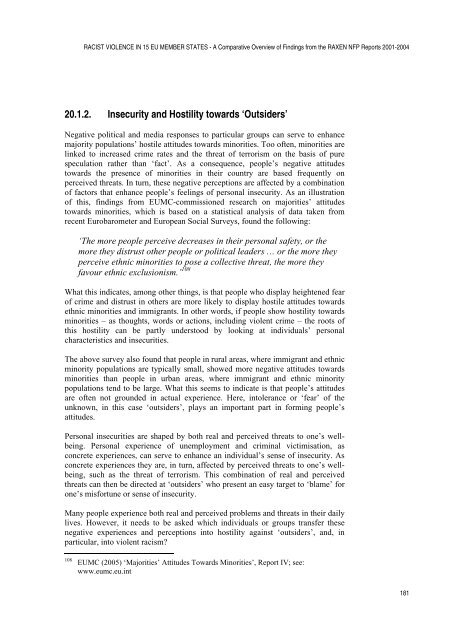RACIST VIOLENCE IN 15 EU MEMBER STATES - Cospe
RACIST VIOLENCE IN 15 EU MEMBER STATES - Cospe
RACIST VIOLENCE IN 15 EU MEMBER STATES - Cospe
You also want an ePaper? Increase the reach of your titles
YUMPU automatically turns print PDFs into web optimized ePapers that Google loves.
<strong>RACIST</strong> <strong>VIOLENCE</strong> <strong>IN</strong> <strong>15</strong> <strong>EU</strong> <strong>MEMBER</strong> <strong>STATES</strong> - A Comparative Overview of Findings from the RAXEN NFP Reports 2001-2004<br />
20.1.2. Insecurity and Hostility towards ‘Outsiders’<br />
Negative political and media responses to particular groups can serve to enhance<br />
majority populations’ hostile attitudes towards minorities. Too often, minorities are<br />
linked to increased crime rates and the threat of terrorism on the basis of pure<br />
speculation rather than ‘fact’. As a consequence, people’s negative attitudes<br />
towards the presence of minorities in their country are based frequently on<br />
perceived threats. In turn, these negative perceptions are affected by a combination<br />
of factors that enhance people’s feelings of personal insecurity. As an illustration<br />
of this, findings from <strong>EU</strong>MC-commissioned research on majorities’ attitudes<br />
towards minorities, which is based on a statistical analysis of data taken from<br />
recent Eurobarometer and European Social Surveys, found the following:<br />
‘The more people perceive decreases in their personal safety, or the<br />
more they distrust other people or political leaders … or the more they<br />
perceive ethnic minorities to pose a collective threat, the more they<br />
favour ethnic exclusionism.’ 108<br />
What this indicates, among other things, is that people who display heightened fear<br />
of crime and distrust in others are more likely to display hostile attitudes towards<br />
ethnic minorities and immigrants. In other words, if people show hostility towards<br />
minorities – as thoughts, words or actions, including violent crime – the roots of<br />
this hostility can be partly understood by looking at individuals’ personal<br />
characteristics and insecurities.<br />
The above survey also found that people in rural areas, where immigrant and ethnic<br />
minority populations are typically small, showed more negative attitudes towards<br />
minorities than people in urban areas, where immigrant and ethnic minority<br />
populations tend to be large. What this seems to indicate is that people’s attitudes<br />
are often not grounded in actual experience. Here, intolerance or ‘fear’ of the<br />
unknown, in this case ‘outsiders’, plays an important part in forming people’s<br />
attitudes.<br />
Personal insecurities are shaped by both real and perceived threats to one’s wellbeing.<br />
Personal experience of unemployment and criminal victimisation, as<br />
concrete experiences, can serve to enhance an individual’s sense of insecurity. As<br />
concrete experiences they are, in turn, affected by perceived threats to one’s wellbeing,<br />
such as the threat of terrorism. This combination of real and perceived<br />
threats can then be directed at ‘outsiders’ who present an easy target to ‘blame’ for<br />
one’s misfortune or sense of insecurity.<br />
Many people experience both real and perceived problems and threats in their daily<br />
lives. However, it needs to be asked which individuals or groups transfer these<br />
negative experiences and perceptions into hostility against ‘outsiders’, and, in<br />
particular, into violent racism?<br />
108<br />
<strong>EU</strong>MC (2005) ‘Majorities’ Attitudes Towards Minorities’, Report IV; see:<br />
www.eumc.eu.int<br />
181
















